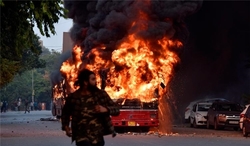 Iranian Vice-President for Citizenship Rights Shahindokht Molaverdi said that the recent stances undertaken by her country’s foreign ministry in regard with brutalities in India shows that Tehran is concerned with the issue of Muslims, adding that, however, more deterrent policies are needed.
Iranian Vice-President for Citizenship Rights Shahindokht Molaverdi said that the recent stances undertaken by her country’s foreign ministry in regard with brutalities in India shows that Tehran is concerned with the issue of Muslims, adding that, however, more deterrent policies are needed. RNA - “As a Muslim country, we have a bigger responsibility [than others] towards the ongoing disaster in India, and we should prioritize human and religious observations over other matters in this regard,” Molaverdi said.
Referring to the Iranian foreign minister’s comments over the “organized violence” against the Indian Muslims, Molaverdi said, “This shows that the issue [of Muslims] is now high on the agenda of our foreign diplomacy.”
However, she stressed, “Our actions must be conducted in a way that is effective and deterrent so as to prevent the repetition of such crimes, and we need to set a clear policy over the issue on the regional and international level.”
She said that the ongoing disaster is of much importance that it is “imperative to address this issue in the meetings of the members of the Organization of the Islamic Countries (OIC).”
“We should also, in some way, use other existing international mechanisms to tackle it," she added.
Molaverdi further noted that the public campaigns and civil entities and institutions can be effectively employed to condemn these crimes and reach a proper solution as soon as possible.
Last month, in the worst communal violence in decades in New Delhi, nearly 50 people were killed and over 100 wounded as groups chanting Hindu nationalist slogans torched mosques and dozens of Muslim houses.
Last month’s worst anti-Muslim violence by Hindu nationalists began on the eve of a state visit by US President Donald Trump, infamous for his anti-Muslim rhetoric and policies.
Anti-Muslim violence started in India amid widespread protests over the Citizenship (Amendment) Act (CAA) that Prime Minister Narendra Modi’s Hindu nationalist government introduced in December, offering a path to Indian citizenship for six religious groups from neighboring countries, specifically excluding Muslims.
Critics insist the law is discriminatory, coming in the wake of other severe government measures against the country’s Muslim population such as withdrawal of autonomy for Muslim-majority Jammu and Kashmir province that has intensified discord across India about the future of its 200 million Muslims.
According to Fars News Agency, last Monday, Iranian Foreign Minister Mohammad Javad Zarif condemned the outburst of violence against Indian Muslims, urging New Delhi to protect all of its citizens regardless of their faith and ethnicity.
“Iran condemns the wave of organized violence against Indian Muslims,” Zarif said in a tweet, while highlighting amicable relations between Tehran and New Delhi
“For centuries, Iran has been a friend of India,” he said, adding, “We urge Indian authorities to ensure the wellbeing of ALL Indians & not let senseless thuggery prevail.”
“Path forward lies in peaceful dialogue and rule of law,” Zarif concluded.
Before Zarif, Iranian Foreign Ministry Spokesman Seyed Abbas Mousavi voiced his country’s serious concern about the rising atrocities against Muslims in India, adding that Tehran is consistently following up the case.
“We are following the news coming from India with concern,” Mousavi said in his weekly presser.
“The Islamic Republic of Iran is following up on the issue through many channels and we have heard that some Muslim countries have had some movements.”
“We know India as a country where all ethnicities and religions live peacefully side by side,” he said, adding, “We hope that violence against Muslims in India would come to an end.”
“Considering the wisdom of Indian authorities that we are aware of, the country will become a peaceful place for all ethnicities,” he said.
847/940